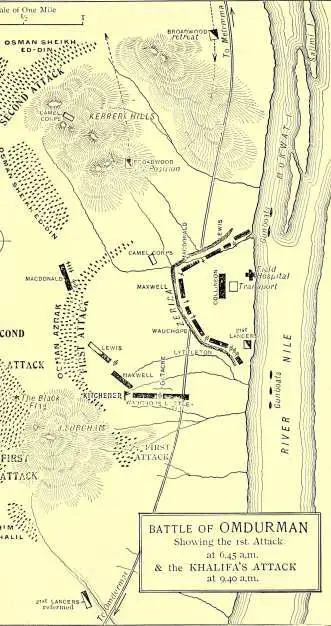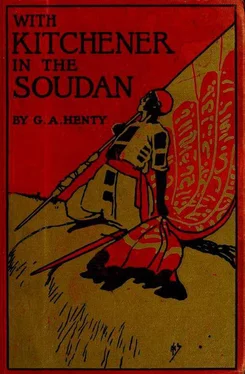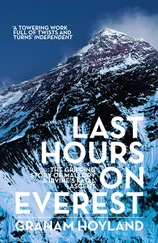Next morning the four squadrons of Egyptian horse, with a portion of the cavalry, went forward to reconnoitre, and one of the gun-boats proceeded a few miles up the river. Neither saw anything of the enemy. There had been heavy rain during the night; this had ceased at daybreak, and a strong wind speedily dried the sands, raising such clouds of dust that it was difficult to see above a few yards. The storm had also the effect of hindering the flotilla. On the other side of the river Stuart - Wortley's friendlies had a sharp brush with some Dervishes, whom they had come upon raiding a village whose inhabitants had not obeyed the Khalifa's orders to move into Omdurman. As the rain-storms continued, it was decided by a council of war that the health of the troops would suffer by a longer stay.
On the 29th, therefore, the army set out in order of battle, ready to encounter the Khalifa's attack, but arrived without molestation at Urn Teref, a short distance from Kerreri, where it was expected the enemy would give battle. The camp was smaller than those hitherto made, and was protected by a strong zareba. The sentries were doubled and patrols thrown out. Heavy rain set in after sunset, and almost a deluge poured down. The tents had been left behind, and as the little blanket-shelters were soon soaked through, their occupants were speedily wet to the skin. It was still raining when at half-past five the force again started. As before, the army was marching in fighting order. The day was cool and cloudy, and at one o'clock they halted at a village called Merreh or Seg. The cavalry had come into touch with the Dervish patrols, but the latter, although numerous, avoided combat. In one of the deserted villages was found one of Wingate's spies in Dervish attire. He had left Omdurman thirty hours before, and brought the news that the Khalifa intended to attack at Kerreri.
This place had been chosen because there was current an old prophecy by a Persian sheik to the effect that English soldiers would one day fight at Kerreri and be destroyed there. It had therefore become an almost holy place to the Mahdists, and was called the death-place of all the infidels, and once the Khalifa and his followers made a pilgrimage to it. A few shots were fired during the night, and fires blazed on the hills to notify to Omdurman our precise position.
The troops started again soon after daylight, facing now to the right and marching westward, to leave the bush and broken ground and get out in the open desert stretching away to Omdurman. The cavalry were widely spread out, and the Lancers ascended to the top of the hill of El Teb, from which a view of the Dervish camp was obtained.
It lay some ten miles due south. The Dervishes were disposed in three long lines stretching from within two thousand yards of the Nile out into the desert, being careful to get, as they believed, beyond the range of the four gun-boats that steamed quietly up. After a short march the force halted near the river, two miles north of Kerreri. The place was convenient for camping, but the banks of the river were steep, and there was much difficulty in watering the horses and transport animals.
" We are in for another bad night," one of the General's staff said to Gregory as the evening approached.
"It looks like it; clouds are banking up fast. If the rain would but come in the daytime instead of at night one would not object to it much. It would lay the dust and cool the air; besides, on the march we have other things to think of, and though of course we should be drenched to the skin, we should not mind it. But it is very unpleasant lying in a pool of water with streams running in at one's neck."
"As to one's blanket, it is like a sponge five minutes after the rain begins," the officer said.
"I am better off in that respect," Gregory remarked, "for when I left my little tent behind, I kept a waterproof sheet instead of my second blanket. I had intended to use it tent fashion, but it was blown down in a minute after the first storm burst. Now I stand up, wrap my blanket tightly round me, while my boy does the same with the waterproof sheet, and I keep moderately dry, except that the water will trickle in at the end near my neck; but, on the other hand, the wrapping keeps me so hot that I might almost as well lie uncovered in the rain."
The staff had intended taking a few tents with them, but these were practically of no use at all, as all canvas had to be lowered by the time that "lights out" sounded, and after that hour no loud talking was permitted in the camp. This might have been a privation had the weather been fine, but even the most joyous spirit had little desire for conversation when the rain was falling in bucketfuls over him. The officers of the white division lay down by their men in the position they would occupy if an attack by the enemy took place. The officers of the Egyptian regiments lay together just in rear of their men. As soon as the " last post" sounded absolute silence reigned. The sentries placed a very short distance out kept their senses of sight and hearing on the alert, and with eye and ear strove to detect the approach of a lurking foe. Jaalin scouts were stationed outside the zareba, so as to give an early warning of the approach of the enemy; but no reliance could be placed upon them, for, altogether without discipline, they would probably creep under bushes, and endeavour to find some shelter from the pitiless downpour.
Had the Khalifa known his business he would have taken advantage of the tempestuous nights and launched his warriors at the camp. Confident as the officers of the expedition were in the ability of their men to repulse any assault that might be made in the daylight, it was felt that such an attack would cause terrible loss, and possibly grave disaster, if delivered at night. The enemy might not be discovered until within a few yards of the camp, the swish of the rain and the almost incessant crash of thunder would deaden the sound of their approach, and long before the troops could leap to their feet and prepare to receive them calmly, the Dervishes would be upon them. As the latter were enormously stronger in numbers, the advantage of superior weapons would be lost in a hand-to-hand fight, and in the inevitable confusion, as the troops in reserve would be unable to open fire while ignorant of the precise position of friends and foes. The Khalifa, however, was relying upon prophecy. It was at Kerreri that the infidel army was to be utterly destroyed, and he may have thought that it would be tempting fate were he to precipitate an action before the invaders reached the spot where their doom had been pronounced.
Even more miserable than night was the hour before dawn. Lying still, drenched to the skin as they were, Nature prevailed, and the men obtained some sleep; but when they rose to their feet and threw off the sodden blankets, they felt the full misery of eight hours' drenching; they were cold now as well as wet, and as they endeavoured to squeeze the water from their clothes, and to restore circulation by swinging their arms, but few words were spoken, and the rising of the sun, which was regarded as a terrible infliction during the day, was eagerly looked for. No sooner did it appear above the horizon than the spirits of the men rose rapidly, and they laughed, joked, and made light of the inconveniences of the situation. An hour later their clothes were nearly dry. By

SECOND
BATTLE OF OMDURMAN
Showing the 1st. Attack
at 6,45 a.m.
& the KHALIFA'S ATTACK
at 9,40 a,m.
that time they were all well on their way, the brigades as before marching in echelon—Wauchope's brigade on the left, Lyttleton's farther to the right but more to the rear, the three Egyptian brigades farther out on the plain, the 21st Lancers scouting the ground in front of the British division, and the native cavalry and camel corps out beyond the right of the Egyptians. All expected that at least they should have a skirmish before they reached Kerreri, where they were to encamp, but as they advanced it was found that the Dervishes had fallen back from that line and had joined the Khalifa's main force near Omdurman.
Читать дальше













